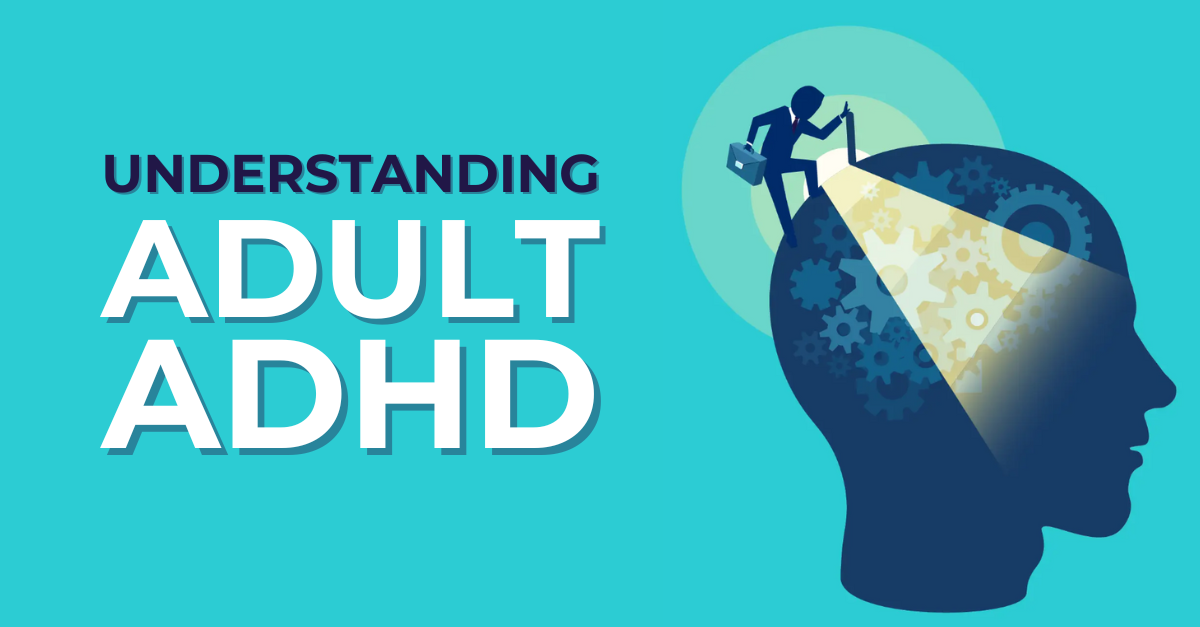October 21st, 2021

The COVID-19 virus has undoubtedly brought increased stress from loneliness to economic stress. Adults are having to change not only their lifestyles but also navigate changes in career paths or workplace environments. Their once structured and active office environment full of meetings, consults, and hands-on work may now be limited to one room, sitting in front of a computer from 9 to 5.
As adults adapt to these changes, they may notice subtle changes in concentration. They may be distracted by household chores, their home relatives, or their pets looking for attention. They may feel easily swept into boredom and catch themselves daydreaming of vacations that were canceled. This may lead several adults to the question: “Do I have ADHD?”
The specific causes and risk factors for Attention-deficit/hyperactivity disorder (ADHD) are still unknown. While ADHD is known to potentially have genetic factors or pregnancy risks leading to increased rates, there is not yet one or a combination of determining factors. ADHD is considered a neurodevelopmental disorder that begins in childhood and is marked by executive functioning deficits such as not paying attention, hyperactivity, and impulsivity.

ADHD symptoms look different in adults compared to children. This is often due to compensatory measures learned in academic or social situations as an individual develops into adulthood. For instance, an adult with hyperactivity knows they cannot get out of their seat in the middle of a work meeting. Instead, he or she may tap their foot, chew gum, or doodle as they take notes to reduce their feelings of restlessness.
Adults with ADHD may lose jobs or receive disciplinary action at work for not completing tasks on time, being too social, and forgetting instructions. They often report concerns with multitasking as switching from one task to another takes longer to adapt.
Another sign of ADHD is “hyper-focusing”. This means an adult may pay too much attention to detail and forget to complete a task or not have enough time to adequately finish another. For example, a dishwasher may spend forty minutes removing all the rust stains and polishing a pan back to near perfection but have little time to complete the remaining dishes in the sink. This is because individuals with ADHD often find it hard to organize, plan, and prioritize tasks.
ADHD can often be confused with other mental health issues. This is because several other diagnoses overlap with the cognitive issues seen in ADHD. A few examples are presented below.

Covid-19 has seen a large increase in stress with fewer ways to manage it, potentially leading to an uptick in substance use. For example, resilience-promoting activities, like physical activity and social interactions weren’t safe to engage in during the beginning of the pandemic as COVID rates were astronomically on the rise.
Mental health care facilities were navigating the process of keeping patients safe. This often leads to fewer appointments to facilitate site-wide cleaning and sanitizing. Resources that were previously readily available became limited. This could also have been a factor in the increase of substances as patients tried to cope with the increasingly occurring changes of the world.
Unfortunately, that extra glass of wine each night to cope with another long day of working from home might be negatively contributing to cognitive deficits.

ADHD Diagnoses are best determined by psychological testing through a licensed psychologist. During this testing process, a patient is asked to undergo a full clinical intake, self-assessments, cognitive tests, and mental health assessments.
Be wary of online assessments that only complete self-assessment questionnaires or ask for background information as they may not fully encompass the severity, type, and comorbid factors of your situation. Self-questionnaires alone can have a 78% false-positive rate for ADHD. (Harrison, Nay, & Armstrong 2019).
Full psychological testing helps to rule out other cognitive concerns such as a neurodevelopmental disorder, learning issues, or autism. This comprehensive testing can also better help your understanding of any ongoing mental health issues. They can be treated simultaneously with improving cognitive concerns.
More specifically, the following areas of testing are usually assessed during a full psychological battery for an ADHD assessment:
ADHD Testing typically varies from person to person but typically takes three to six hours depending on presenting concerns. Testing is also non-invasive, meaning it does not include needles, medication changes, or attaching electrodes to one’s body. Most tasks consist of paper-pencil methods, assessing pictures, utilizing blocks, and answering questions.
Usually, the biggest risks include minor headaches from mental fatigue or pain from sitting for prolonged periods. Testing also generally results in a diagnosis, sometimes which is emotionally difficult for the patient to receive. Following an ADHD diagnosis, accommodations become available to patients.

Did you know? ADHD is considered a disability under both the ADA and another law known as the Rehabilitation Act of 1973. Much like someone with a physical disability would need certain accommodations to assist them in their workplace or academic education, those with ADHD need help to increase performance.
For example, many individuals with ADHD have difficulty processing information quickly and may have trouble keeping up with quotas. Therefore, they may need extra time to complete tasks. Below are some examples of common accommodations across settings:
Education (including college)
Employment
Home
Medical/Mental Health Care
Written By: Dr. Ashley Head, PsyD
At Clarity Clinic, we have highly trained psychiatrists and psychiatric providers who specialize in comprehensive ADHD treatment. Whether you're experiencing ADHD symptoms or wondering, "Do I have ADHD?", we offer a range of services to help.
Start by taking our ADHD quiz to gain insight into your symptoms. From there, book a consultation to explore personalized treatment options, including ADHD medication and therapy, with an experienced ADHD psychiatrist near you. Let us guide you on the path to managing ADHD and improving your quality of life.
We have mental health clinics located throughout Chicago such as the Loop, River North, Lakeview Belmont, and Lakeview Broadway. If you are located in surrounding suburbs, no worries! We have a clinic in Evanston and Arlington Heights for those located in areas such as Oakbrook, Northbrook, Schaumburg, Winnetka, or Naperville, IL.
Book a ConsultationIf you notice you are showing signs of ADHD, take our free ADHD test online! Once you review your results you can determine if you should book a consultation with one of our providers for leading ADHD treatment and consultation. Clarity Clinic is here to support your mental health!
Free ADHD TestOur Services
Virtual/Online CarePHP and IOPAdult PsychiatryChild & Adolescent PsychiatryAdult TherapyChild & Adolescent TherapyCouples CounselingFamily TherapyGroup TherapyPsychological TestingTranscranial Magnetic Stimulation (TMS)